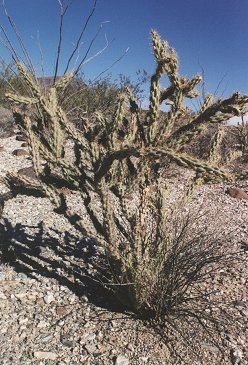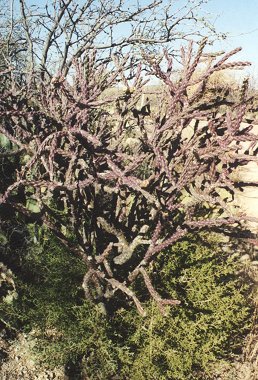Buckhorn and Staghorn are members of the
Opuntia genus, a group which includes other spiny cacti like prickly
pear.
Four characteristics distinguish Opuntia from other cactus:
|
|
1.
2.
3.
4.
|
They have jointed
segments
The areoles have minute barbed spines called glochids that are
easily detachable
Rudimentary leaves are present on new joints
Their seeds have a pale covering called an aril |
These two chollas are very similar in appearance and are
sometimes difficult to differentiate.
 Both
have many thin branches that arise from the ground or a central stalk
and grow to a height of 8-10 feet. They prefer sandy soils and grow at
elevations from 1000 to 4000 feet. The Staghorn has a broad range and
can be found throughout the Sonoran and Mohave Deserts. The Buckhorn's
range is restricted to southern Arizona and northern Mexico. Both
have many thin branches that arise from the ground or a central stalk
and grow to a height of 8-10 feet. They prefer sandy soils and grow at
elevations from 1000 to 4000 feet. The Staghorn has a broad range and
can be found throughout the Sonoran and Mohave Deserts. The Buckhorn's
range is restricted to southern Arizona and northern Mexico.
|
Though similar in appearance, the
Staghorn Cholla (below) tends to have more of a purple tint than
the Buckhorn Cholla (at right). |
The chollas bloom in April or May and produce bright
flowers to 2 1/4 inches wide that range in color from red, yellow,
orange, pink, & purple to greenish or brownish. After flowering, the
plants produce fruit. The fruit of the Buckhorn Cholla tends to be dry
with long spines. The fruit falls from the plant after a few
months. The fruit of the Staghorn Cholla is fleshy and spineless and
remains attached to the plant throughout the winter. Native Americans
used the fruits and buds of these cacti for food.

|

